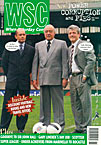 Did Terry Venables take illegal bungs during Teddy Sheringham's transfer to Tottenham?
Did Terry Venables take illegal bungs during Teddy Sheringham's transfer to Tottenham?
Church bells peal across the land as the Premier League bungs inquiry finally publish their report. Crowds gather admiringly around anyone who has managed to read it all the way through. The report’s 300 pages, and the ten thousand pages of evidence, focus mainly on the transfer of Teddy Sheringham from Forest to Spurs in 1992. It’s a massively complicated tale, likely to defeat even the most diligent reader in much the same way as the famous Panorama programme on Terry Venables’ dealings at Spurs lost many viewers long before the fiftieth photocopied invoice flashed onto the screen.
But there seems to be some sort of method to it all because the more complex his manoeuvrings become, the more tempting it becomes to just accept Venables’ line that he has done nothing wrong. A telling comment leaps out of the double page World Exclusive whinge from Venables in the News of the World the day after the report was released: “I’ve never been in court, never been involved with the police.”
The first part of that statement is so untrue as to be laughable. He’s on first name terms with the High Court ushers. The second part is at best selective – judicial authorities have looked at his affairs, though the Crown Prosecution Service decided not to prosecute. The Department of Trade and Industry has, however, begun moves to have Venables disqualified as a director, though they have dragged on and on.
Which brings us to his associate Eddie Ashby, convicted of illegally acting in a management role in a company after being struck off as a director, and warned by the judge that a prison sentence is likely. Venables was responsible for Ashby’s appointment at Spurs, at Scribes, and has employed him at Portsmouth, prompting the resignation of at least one director.
Venables has been in court, making the same sort of noises on his friend’s behalf that he has long made on his own. To no avail. He has lost countless court actions, in fact, but in the manner of a football manager trying to claim something positive from a hiding, has always put out press statements pushing the blame away from himself, portraying a defeat as being down to an arbitrary judging decision, and a rare victory as proof that the team has been on the right tracks all along.
It’s the tried and tested Venables formula. His evidence has been “wanton” according to a High Court judge, and “self contradictory” according to the Premier League report, a mix of brazen untruths and bleating defiance: no matter how much suspicion builds up, though he just fronts it out, claiming it’s all the work, as NoW readers were told of “my enemies who were quite openly using newspapers and television to spread their poison”.
The sort of newspaper story Venables must have in mind appeared the same day, in the People. David Webb, it seems, was employed by Spurs as a scout during Euro 92, which he watched on television from a bar in the Algarve. At the end of the tournament the only player he recommended was Gary McAllister. Spurs were invoiced for this service, and they paid up.
Webb told the bung committee that his mission had been only “semi serious”, the money he received being some sort of compensation for his having failed to get the Spurs manager’s job. But he was paid ten thousand pounds for it. It’s almost funny, making Webb and Venables seem more than ever like archetypal chancers outsmarting authority figures in a 1940s comedy film. They’d fit into the immediately post-War world for another reason, for the “cult of dishonesty” that the Premier League report speaks of can trace its origins back to what now seems like football’s pre-history, the days of the maximum wage.
The ‘missing millions’ that people often talk of in relation to those times might just as well refer to money. There were huge crowds in the Forties and Fifties, sixty thousand a regular occurence in the old First Division, twenty five thousand and more in the regional Third Division. Clubs, though, spent little on the upkeep of the stadia beyond the bare essentials; unlike today they didn’t diversify into other businesses; and there was a ceiling on players’ wages, so where did all that gate money go?
The answer can be found in part by looking at the odd transfer deals that used to happen. Players denied a legitimate means of increasing their salaries, experienced internationalists among them, often dropped a division or even two when at their peak, lured by clubs who were at the centre of a flourishing black economy. This was a culture where players stuffed ‘bonuses’ of various kinds into their boots and regularly bet on matches they played in, the results of which were sometimes established in advance.
Although there has never been a suggestion that he was involved in any such activities, Terry Venables, an apprentice at the end of the Fifties, is a product of that time, as is George Graham, who saw nothing wrong in accepting a huge cash gift from a players’ agent and may still be a little mystified to have been the only manager yet found guilty of accepting backhanders.
But it’s all behind us now, apparently. “Football is essentially a clean industry,” said the new Premier League chief executive Peter Leaver, which is just as well, since the report has taken four years to compile and all manner of things might have gone on in the meantime. Funny, but no one seems very reassured.
From WSC 129 November 1997. What was happening this month